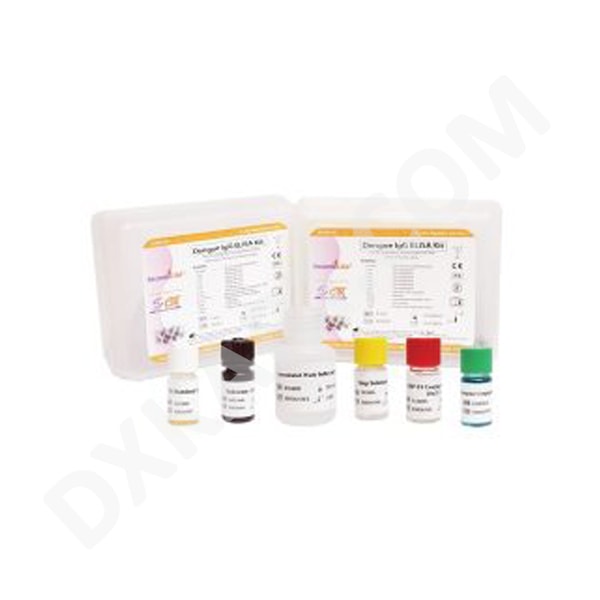
CTK Biotech, USA
Dengue IgG ELISA Kit
₹ 12500
₹ 7434
Pack Size:96 Test/Kit
quantity
product details
The RecombiLISA Dengue IgG ELISA Kit is a solid-phase, IgG capture enzyme linked immunosorbent assay.

CTK Biotech, USA
Pack Size:96 Test/Kit
The RecombiLISA Dengue IgG ELISA Kit is a solid-phase, IgG capture enzyme linked immunosorbent assay.
The RecombiLISA Dengue IgG ELISA Kit is a solid-phase, IgG capture enzyme linked immunosorbent assay. The three main kit components are: 1) A 96 breakable well plate with the solid microwells pre-coated with mouse monoclonal anti-human IgG antibody 2) Recombinant dengue antigen 3) HRP-anti-dengue conjugates This test is intended to be used for the qualitative detection of IgG anti-dengue viruses (DEN1,2,3,4) in human serum or plasma. It is intended to be used by professionals as an aid in the diagnosis of active infection with dengue viruses, including secondary infection. Any interpretation or use of this test result must also rely on other clinical findings as well as on the professional judgment of health care providers. Recommended for use: Any person presenting with clinical signs or symptoms consistent with acute dengue infection or dengue fever including: high fever, severe headaches, pain behind the eyes, severe joint and muscle pain, fatigue, nausea, vomiting, and/or skin rash. During primary infection, anti-dengue IgG antibodies become detectable by the end of the first week of illness. They increase slowly to peak around 14-21 days, and then decrease to low levels, persisting for the duration of life. During secondary infection, a strong and rapid IgG antibody response is often observed. IgG levels are detectable as early as 3 days after the onset of symptoms, with the peak detection window being 1-2 weeks after symptom onset. In secondary infection, IgG antibodies rise to levels higher than during primary infection. Importantly, anti-dengue IgG antibodies increase earlier than or simultaneously with IgM antibodies, and at much higher levels during secondary infection.
TEST PRINCIPLE The RecombiLISA Dengue IgG ELISA Test is a solid-phase, enzyme-linked immunosorbent assay based on the principle of the capture immunoassay methodology for the detection of IgG anti-dengue virus in human serum or plasma. The RecombiLISA Dengue IgG ELISA Test is composed of two key components: 1) Solid microwells pre-coated with mouse monoclonal anti-human IgG antibody; 2) Conjugate working solution composed of dengue antigens and HRP-anti-dengue conjugates. During the assay, the test specimen is first incubated in the coated microwell. IgG anti-dengue, if present in the specimen, binds to the anti-human IgG antibodies coated on the microwell surface, and any unbound specimen is then removed by a wash step. During a second incubation with HRP-anti-dengue conjugate working solution, the IgG anti-dengue absorbed on the surface of microwell binds to the conjugate through dengue antigen, forming a conjugate complex. Unbound conjugates are then removed by washing. After addition of the TMB substrate, the presence of the conjugate complex is shown by development of a blue color resulting from a reaction between the enzyme and substrate. This reaction is then quenched by addition of the Stop Solution, and the absorbance value for each microwell is determined using a spectrophotometer at 450/620-690 nm.